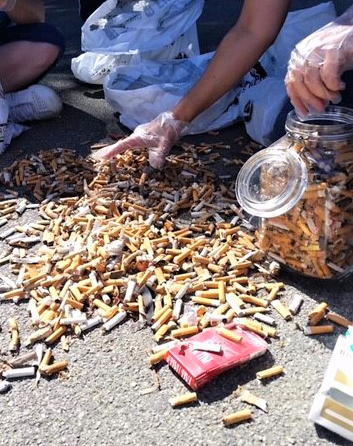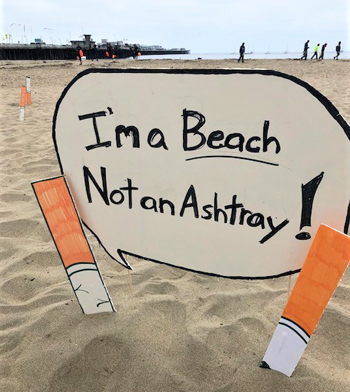
 Isn’t it time we told tobacco companies that Santa Cruz County isn’t their ashtray?
Isn’t it time we told tobacco companies that Santa Cruz County isn’t their ashtray?
Yuck! Cigarette butts. They’re everywhere. They’re so common that some people don’t even notice anymore. In fact, cigarette butts are the #1 item found on California beaches and roadways. Members of the Tobacco Education Coalition think it’s time for Big Tobacco to clean up their mess. You can help.
Not Just Litter, Toxic Waste
The billions of cigarette butts littering our streets, parks, and waterways aren’t just litter—they’re toxic waste. Cigarette filters are made of cellulose acetate, a type of plastic that, over time, breaks down into microplastic particles. They leach toxic chemicals into the environment including lead, arsenic and nicotine. There are major environmental and public health impacts from this waste, not to mention the cost to local governments and tax payers who pay to pick it up. And now, e-cigarettes have created a brand new source of pollution with their battery-operated devices and single-use plastic flavor pods!
A Threat to Children, Pets, and Wildlife
Cigarette butts in our parks, playgrounds and other open spaces can poison children, pets, and wildlife. They also harm our beloved Santa Cruz County beaches and ocean habitats, including the Monterey Bay National Marine Sanctuary. In addition, tobacco waste is an environmental justice issue. Low-income communities and communities of color bear the highest burden from this toxic waste. These are the same communities that have the highest density of tobacco retailers and tobacco advertising.
What Can You Do?
There are lots of things individuals can do to keep tobacco waste out of our environment. Most importantly, don't smoke or vape. If you do, properly dispose of your tobacco waste. Educate your family and friends about the environmental impact of tobacco products. Take part in cleanups and awareness events. You can also let your local policy makers know that you care about this issue. Tell them that you want to see policies passed that hold Big Tobacco responsible for the damage their products do to both human and environmental health! 
Use Your Voice to Make Change
The Coalition is working to educate local leaders about policy solutions to end tobacco waste. Come to Coalition meetings to strategize about next steps! You could help with activities such as: conducting public opinion polls about tobacco litter; gathering tobacco litter data; attending educational meetings with policy makers; writing letters, articles and op-eds about tobacco waste for local publications.
Tobacco Waste Resources